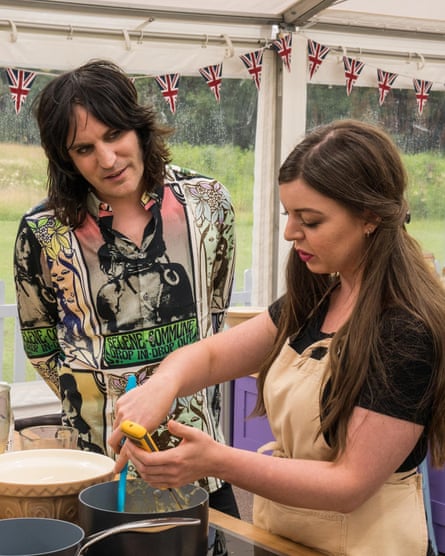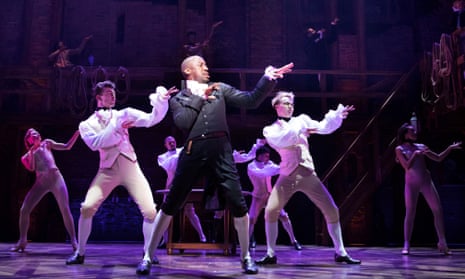The West End debut of the hit Broadway musical Hamilton, mega gigs including U2 and Guns N’ Roses and the return of Star Wars helped propel the UK’s live entertainment sector to a record £17bn in revenues last year.
Growth will continue this year as the UK’s live economy – which ranges from cinema visits to attending music and arts festivals, sports events, and live tours of TV shows including The X Factor – is forecast to surge by another £400m.
Revenue from live performances, such as concerts or the theatre, hit £2.1bn last year and is expected to grow a further 7% this year, according to a report from Deloitte. Concert-going is the largest part of the live performance sector, accounting for more than half of the total revenues.
The terrorist bombing of Ariana Grande’s concert in Manchester did not deter gig-goers, as the number of shows staged across the UK soared, while Metallica broke attendance records at the O2 in London.
Live Nation, which owns Ticketmaster, said it had a record year in the UK, with a 44% increase in the number of shows for which it sold tickets. Globally, Live Nation’s ticket sales were up 20% to more than 80m, according to its most recent figures published in October.

The eagerly anticipated arrival of Lin-Manuel Miranda’s Hamilton – alongside the continued popularity stalwarts such as Les Misérables, the longest running musical – is keeping theatreland booming.
In addition, experiential events, from Tough Mudder and the continuing proliferation of festivals to Secret Cinema’s annual themed experiences, have continued to grow in popularity. Last year, Secret Cinema’s Moulin Rouge drew 80,000 while 100,000 fans flocked to the Star Wars experience in 2016.
“This isn’t just limited to one particular genre, all events are performing well,” said Denis Desmond, the chair of Live Nation UK, also pointing to comedy, which had a big year including major tours by Micky Flanagan and Ricky Gervais.
Any fear that the explosion in popularity of streaming services such as Netflix might create a stay at home couch culture have failed to materialise.
“Some commentators may have prematurely sounded the death knell for live attendances,” says Dan Ison, the head of media and entertainment at Deloitte. “Live content and events are thriving in a digital world.”
Max Alexander, the chief executive of Secret Cinema, said: “Netflix is everyone’s favourite sofa buddy but increasingly people seek the thrill of live entertainment – communal, participative events with long lasting memories.”
Revenue from ticket sales to sports events was £800m last year and is expected to grow another 2% to £900m this year. Deloitte said paid attendance at professional sports events in the UK rose 7% year-on-year from 69.8m to 74.5m in 2017.
Ticket sales were bolstered by events including the Champions League football final, women’s cricket world cup, the ICC Champions Trophy one-day international cricket tournament and the World Athletics Championships, the most popular single sporting event of last year.
Football accounted for more than 60% of the total, with 47.6 million fans turning up to support their club and country, up 5% on 2016.
“Watching sports live remains a significant market, despite the widespread availability of televised sport and the proliferation of results available online,” Ison said.
Blockbusters including Star Wars: The Last Jedi, Beauty and the Beast and Dunkirk helped the UK box office hit £1.2bn last year, as fans shelled out to catch their favourite films in cinemas rather than wait for them to come to the small screen. Ticket sales were up 1.4% to 170.6m, according to the Cinema Advertising Association.
Deloitte predicts cinema revenues will hold steady this year. Audiences are expected to flock to Hollywood franchises including Avengers: Infinity War, Solo: A Star Wars Story, Deadpool 2 and Jurassic World: Fallen Kingdom.

The consultancy firm estimates that live TV broadcasting – watching sport and other programmes when they are first broadcast – generated £12.1bn for the UK economy last year. This figure comprises revenue from television ads (£3.9bn), pay-TV subscriptions (£6.1bn) and the BBC’s licence fee (£2.1bn). It will rise slightly to £12.2bn this year.
The TV marketing body Thinkbox says 86% of television is still watched at the time dictated by broadcasters’ schedules.
However, when analysts factor in viewers who choose to watch their favourite shows at their leisure by using catch-up TV services or recording them, total audience numbers increase dramatically.
Channel 4 says time-shifted viewing of The Great British Bake Off final bolstered its audience to 11 million, its biggest since A Woman of Substance aired in 1985.
Josh Krichefski, the chief executive of the agency MediaCom UK, said the live content market will continue to grow despite pressure in an on-demand world because people inherently enjoy sharing memorable experiences.
“There is still a great deal of pulling power involved in live activities,” he said. “It is chiefly down to how we are hardwired as humans, living in the moment and enjoying shared experiences as they happen.
“Moments in time like World Cup finals, music gigs and, in media, events like the Bake Off launch and X Factor final still attract huge audiences of millions of live viewers. Audiences still thrive on those in-the-moment thrills.”











Comments (…)
Sign in or create your Guardian account to join the discussion